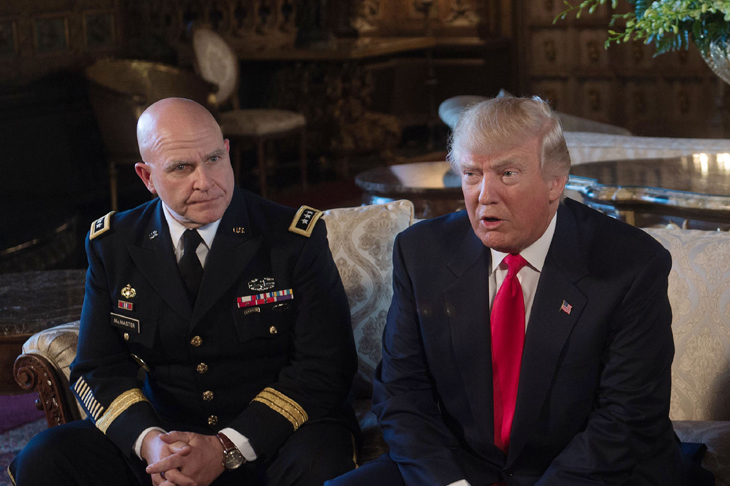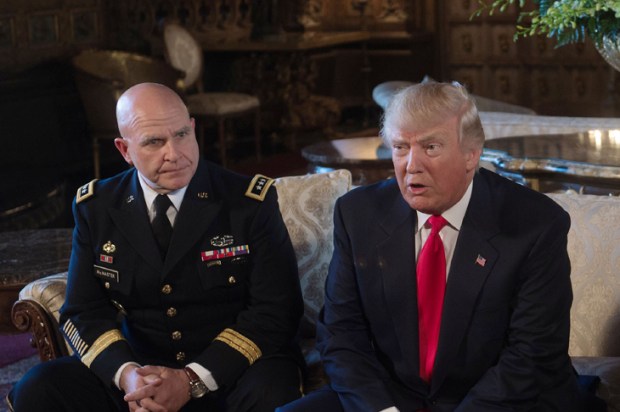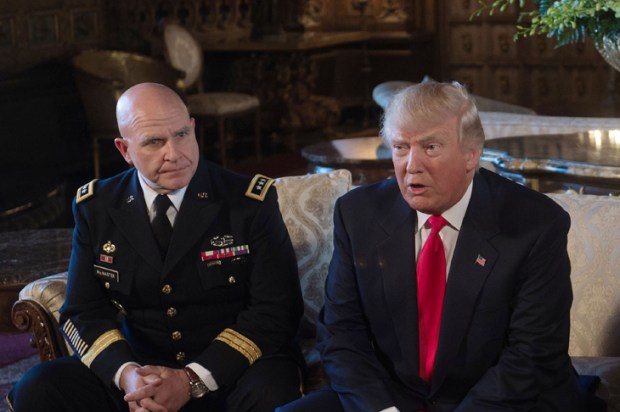When Lt Gen H.R. McMaster was appointed by Donald Trump to the post of national security adviser, newspaper reports hailed him as a military strategist. It’s not fully clear what the phrase means: not, presumably, that he originated a big idea akin to Alfred Thayer Mahan’s theory of seapower or Billy Mitchell’s conception of strategic bombing. More likely it is supposed to mean ‘a soldier who thinks’. Or more crudely, ‘not a knuckle-dragger’. Or ‘preferable to the cretin who Trump just fired’.
Of course, the responsibilities of the position to which McMaster now ascends extend well beyond mere military matters. The national security adviser operates (or should operate) in the realm of ‘grand strategy’. In this rarified atmosphere, preparing for and conducting war coexist with, and arguably should even take a back seat to, other considerations. To advance the interests of the state, the successful grand strategist orchestrates all the various elements of power. While not shrinking from the use of armed force, he or she sees war as a last resort, to be undertaken only after having exhausted all other alternatives.
This distinction between military strategy and grand strategy is more than semantic. Maintaining it is crucial to successful statecraft. Consider the case of 19th-century Germany. Von Moltke the Elder was a gifted military strategist. Bismarck was a master of grand strategy. Their collaboration, with the Iron Chancellor as senior partner, created the modern German state. Once Wilhelm II handed Bismarck his walking papers in 1890, however, the distinction between military and grand strategy was gradually lost. The results became apparent after 1914. In the person of Erich Ludendorff, war absorbed statecraft, with the fall of the House of Hohenzollern the least among the catastrophes that ensued.
US national security policy in the present century bears more than passing resemblance to that of Germany a century ago. Our various armed conflicts, campaigns, interventions, and punitive expeditions occur on a blessedly smaller scale. But the clarity of political purpose informing our military endeavours in the immediate aftermath of 9/11 has eroded with the passage of time. Today it has been largely lost. Our militarists fight on because they lack the capacity to imagine an alternative. In policymaking circles, war has become a habit.
The question is whether H.R. McMaster can play a role in breaking that habit, as President Trump (in his weird, inconsistent way) has suggested he intends to do. To put it another way: can General McMaster restore the distinction between grand strategy and military strategy and re-subordinate the latter to the former?
Little reason exists to suggest that he will do so — or indeed that he is inclined to make the effort. For the past two years, McMaster has devoted himself to contemplations on the future of the United States Army, not the future of the international order. On Russia, he appears to be a neo-Cold Warrior, favouring the recommitment of US ground forces to Europe, a prospect welcomed by an army that today finds itself searching for a raison d’être. On matters ranging from East Asian stability, Israel-Palestine, Iran, nuclear weapons, climate change and cyber–challenges, his views are less clear.
McMaster’s reputation as a thinker does not derive from his expressed views on matters of basic policy. Instead, it rests almost entirely on a book that he published as a young officer nearly two decades ago. The book (now once more rocketing to the top of the Amazon rankings) is called Dereliction of Duty: Johnson, McNamara, the Joint Chiefs of Staff and the Lies That Led to Vietnam. Based on the dissertation that McMaster wrote for a history PhD at the University of North Carolina, Chapel Hill, it remains today one of the most important books about that benighted conflict — a savage indictment of dishonesty among top US civilian and military leaders during the 1960s. On the battlefield, McMaster has demonstrated exemplary courage in the face of the enemy. For my money, he displayed even greater courage, albeit of an intellectual sort, in publishing his book.
The story he tells is an ugly one of civil–military distrust and shared contempt. To conduct the Vietnam War on the terms they wanted, President Lyndon Johnson and defense secretary Robert McNamara sought to marginalise the Joint Chiefs of Staff, even while going through the motions of soliciting their advice. In return, the Chiefs went through the motions of playing along, confident that ever-deeper US military involvement in Vietnam would eventually oblige Johnson and McNamara to fight the war their way. Out of this cynical exercise in mutual manipulation came a debacle that ended in costly and catastrophic failure.
The message of Dereliction of Duty was clear: The Vietnam-era Joint Chiefs of Staff dishonoured themselves and their profession. In doing so, they betrayed the soldiers for whose wellbeing they were responsible. When dealing with matters of basic policy, the paramount obligation of senior military officers is honesty — blunt, candid truth-telling.
McMaster’s book generated widespread acclaim and rightly so. For a young officer to publish such a scathing indictment of four-star generals and admirals carried career risks. But McMaster’s timing turned out to be just about perfect. By the late 1990s, when Dereliction of Duty appeared, members of the Joint Chiefs of Staff and their peers, all of them Vietnam veterans, were in the mood for patricide. They welcomed the criticism that McMaster heaped on the prior generation. After all, their war — the Gulf War of 1990–91 (in which McMaster himself had performed heroically) — had been done right. So at least it seemed at the time. In the officer corps, Dereliction of Duty became required reading.
Through a twist of fate, McMaster now finds himself called upon to fill the role of blunt, candid truth-teller for his generation of military officers — and to do so while serving a commander-in-chief who gives little evidence of valuing those qualities. Yet circumstances demand more than mere straight talk. Only by transcending the role of ‘military strategist’ will General McMaster succeed in doing what duty plainly requires: identifying a course that leads away from permanent war and imparts to what remains of US grand strategy a semblance of coherence.
Got something to add? Join the discussion and comment below.
Get 10 issues for just $10
Subscribe to The Spectator Australia today for the next 10 magazine issues, plus full online access, for just $10.
You might disagree with half of it, but you’ll enjoy reading all of it. Try your first month for free, then just $2 a week for the remainder of your first year.














Comments
Don't miss out
Join the conversation with other Spectator Australia readers. Subscribe to leave a comment.
SUBSCRIBEAlready a subscriber? Log in